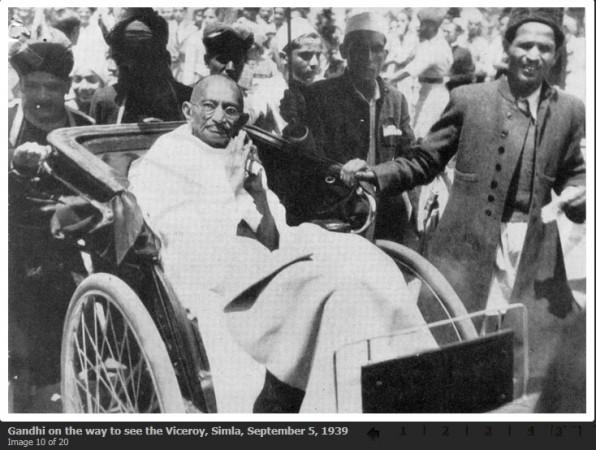
In a world ridden with conflicts, Mahatma Gandhi's principles of non-violence remain relevant nearly a century later, say experts citing the examples of Hong Kong and Sudan.
Angshuman Choudhury, Senior Researcher at the Institute of Peace and Conflict Studies (IPCS), New Delhi, told IANS, "From Hong Kong to Sudan, we have seen ample examples in the recent past where non-violence was used to express dissatisfaction against the state of affairs, despite being confronted with powerful detractors."
Choudhury, who works in the areas of armed conflict, peace processes and forced displacement, said the post-Cold War world has witnessed a rising number of identity-based, political and ideological violence across the world.
While a large chunk of this violence has been civil in nature, often perpetrated by non-state groups against other groups or the state, governments too have indulged in violent acts against individuals or communities.
"In this context, the Gandhian principle of non-violence and peaceful dissent become relevant more than ever before. Such is the legacy of Gandhian principles that even nearly a century later, people around the world continue to believe in non-violence as an effective medium of political expression," he added.
Choudhury said though violence is often the easy way to challenge authority or voice grievances, but it ultimately, leads to greater instability, uncertainty and repression.
Peaceful dissent can be effective in today's social media age. "To maintain a non-violent conscience in the face of overwhelming state power is often tough, but accrues outcomes that are better for everyone. Further, in the age of social media, peaceful dissent can have a larger audience, which is very important for non-violence to work. Thus today, non-violence can be practiced through ways that are creative, effective and pervasive," he added.

As per trends in organised violence and peace agreements collected by the Uppsala Conflict Data Program (UCDP) in 2018, UCDP recorded almost 76,000 deaths globally, a decrease of 20 per cent compared to 2017, and 43 per cent compared to the latest peak in 2014. The number of fatalities in organised violence decreased for the fourth consecutive year, to reach the lowest level since 2012.
"Organised violence, 1989-2018 and peace agreements", an article by Pettersson, Therese; Stina Hogbladh & Magnus Oberg (2019), in the Journal of Peace Research based on the data, notes that state-based armed conflict drives this downward trend in organised violence, with Syria accounting for much of the change.
"The number of civilians killed in one-sided violence also dropped in 2018, reaching its lowest level since 2012. In contrast, non-state conflict remained on a high level. The general decline in fatalities from organised violence does not correspond with the trend in the number of active conflicts. In fact, the world has seen a new peak in the number of conflicts after 2014, matched only by the number of conflicts in the early 1990s," according to the article.
"In 1991, the peak in the number of armed conflicts corresponded with a similar peak in the number of signed peace agreements. This was followed by a decrease in the number of conflicts in the late 1990s and early 2000s. However, the most recent rise in armed conflicts has not been matched by a similar rise in the number of peace agreements. Two circumstances that characterise the recent rise in conflicts have also been found to make conflicts harder to solve: explicitly religious claims and high levels of internationalisation," said the article.
The US based Council on Foreign Relations' Global Conflict Tracker points out the worsening conflict status in Afghanistan, Yemen, Mali and Venezuela among others.
While conflict zones continue to be volatile, a unique march based on Gandhi's principles will set out to spread his message.
On October 2, 2019 - the 150th anniversary of Mahatma Gandhi's birth, a 14,000 km, one-year global march for justice and peace, called 'Jai Jagat 2020', will start from New Delhi to Geneva.
"The arrival of the great march of 'Jai Jagat' bearing the message of Gandhi and the voice of the voiceless is the perfect occasion, through a non-violent dialogue, to promote various solutions for a world that works for everyone," according to the organisers.
For a whole year, it will cross half the planet to carry the message of Mahatma Gandhi in favour of change through non-violence, as well as the voice of the voiceless.
"It is also an opportunity to see how others manage conflict in the various countries through which we travel, and in the process grow to understand cultural and religious differences. In the training itself, we begin by identifying indirect conflict, and determining the causal chain that leads to conflict. From this, we can also learn how to pre-empt conflict and violence. We follow Gandhi's framework in so far as we start with the presumption of non-violence and work to see how this can be integrated into social settings and development interventions," they added.

















